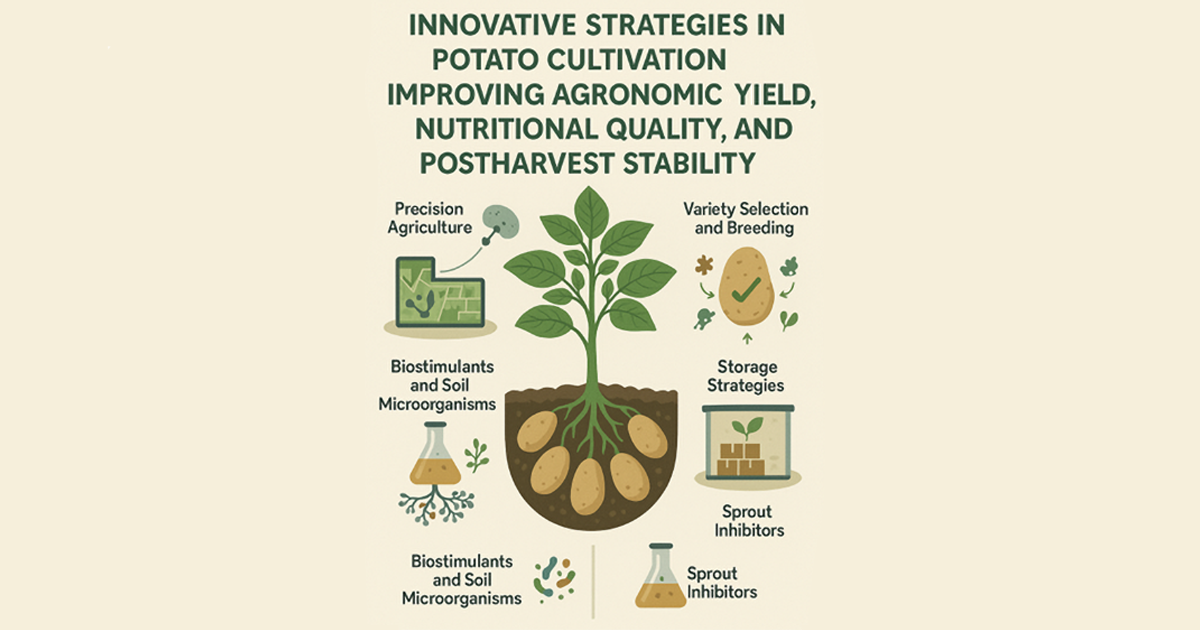Innovative Strategies in Potato Cultivation: Enhancing Agronomic Performance, Nutritional Quality, and Post-Harvest Stability
A special issue of Agriculture (ISSN 2077-0472). This special issue belongs to the section "Crop Production".
Deadline for manuscript submissions: 20 December 2025 | Viewed by 301

Special Issue Editors
Interests: quality; cultivation technology; cultivars; storage technology; quality; nutritional value; pro-health value; bioactive compounds; vegetables; fruits; potato; processing; preservation; fermented products
Special Issues, Collections and Topics in MDPI journals
Interests: quality; cultivation technology; cultivars; storage technology; quality, nutritional value; pro-health value; bioactive compounds; anti-nutritional compounds; vegetables; fruits; potato; environmental
Special Issues, Collections and Topics in MDPI journals
Interests: environmental science; plant fertilization; animal and human nutrition; soil science; fertilizers; soil analysis; soil fertility; plant nutrition; nutrient; management soil chemistry environment
Special Issues, Collections and Topics in MDPI journals
Special Issue Information
Dear Colleagues,
Modern potato cultivation strategies focus on integrating advanced agrotechnical and biological technologies to increase yields, tubers’ nutritional value, and post-harvest shelf life. The use of precision farming, including soil sensors, GPS systems, and satellite data analysis, allows for the optimization of fertilization and irrigation, while the selection and engineering of varieties resistant to biotic and abiotic stresses, such as drought, pathogens, or salinity, affects the stability of production. Biostimulants and soil microorganisms, e.g., mycorrhiza and rhizobacteria, improve mineral utilization and support plant health. In addition, genetic modifications make it possible to enrich potato tubers with nutrients such as mineral salts (Fe, Zn) or antioxidants, and storage strategies using controlled atmospheres and natural germination inhibitors extend tuber life without the need for chemicals. Integrating these approaches can significantly increase the efficiency of potato production while reducing environmental impact.
This Special Issue of Agriculture invites submissions of original scientific articles and review papers focusing on innovative strategies in potato cultivation, increasing yield and improving the nutritional value of tubers, and possibilities of reducing quantitative and qualitative losses after storage.
Papers addressing the following topics are particularly welcome:
- Modern phenotyping techniques and their role in the selection of potato varieties with higher nutritional quality.
- The application of biostimulants and soil microorganisms in potato cultivation and their impact on yield and stress resistance.
- Precision agriculture in potato cultivation involving the integration of sensors, drones, and decision support systems.
- The impact of conservation tillage techniques on the environment, potato tuber quality, and long-term yield stability.
- Modern potato storage technologies, including the control of atmosphere, temperature, and humidity in warehouses.
- Natural sprouting inhibitors as an alternative to chemical storage agents.
Through publishing your latest research results in this Special Issue, you will provide valuable insights into sustainable potato production, improved yield and quality in production systems, and the use of modern tuber storage techniques.
Dr. Jarosław Pobereżny
Prof. Dr. Elżbieta Wszelaczyńska
Prof. Dr. Wiesław Szulc
Guest Editors
Manuscript Submission Information
Manuscripts should be submitted online at www.mdpi.com by registering and logging in to this website. Once you are registered, click here to go to the submission form. Manuscripts can be submitted until the deadline. All submissions that pass pre-check are peer-reviewed. Accepted papers will be published continuously in the journal (as soon as accepted) and will be listed together on the special issue website. Research articles, review articles as well as short communications are invited. For planned papers, a title and short abstract (about 250 words) can be sent to the Editorial Office for assessment.
Submitted manuscripts should not have been published previously, nor be under consideration for publication elsewhere (except conference proceedings papers). All manuscripts are thoroughly refereed through a single-blind peer-review process. A guide for authors and other relevant information for submission of manuscripts is available on the Instructions for Authors page. Agriculture is an international peer-reviewed open access semimonthly journal published by MDPI.
Please visit the Instructions for Authors page before submitting a manuscript. The Article Processing Charge (APC) for publication in this open access journal is 2600 CHF (Swiss Francs). Submitted papers should be well formatted and use good English. Authors may use MDPI's English editing service prior to publication or during author revisions.
Keywords
- conditions
- cultivation technology
- nutritional value
- quality
- storage
- stress
- tuber
Benefits of Publishing in a Special Issue
- Ease of navigation: Grouping papers by topic helps scholars navigate broad scope journals more efficiently.
- Greater discoverability: Special Issues support the reach and impact of scientific research. Articles in Special Issues are more discoverable and cited more frequently.
- Expansion of research network: Special Issues facilitate connections among authors, fostering scientific collaborations.
- External promotion: Articles in Special Issues are often promoted through the journal's social media, increasing their visibility.
- Reprint: MDPI Books provides the opportunity to republish successful Special Issues in book format, both online and in print.
Further information on MDPI's Special Issue policies can be found here.





